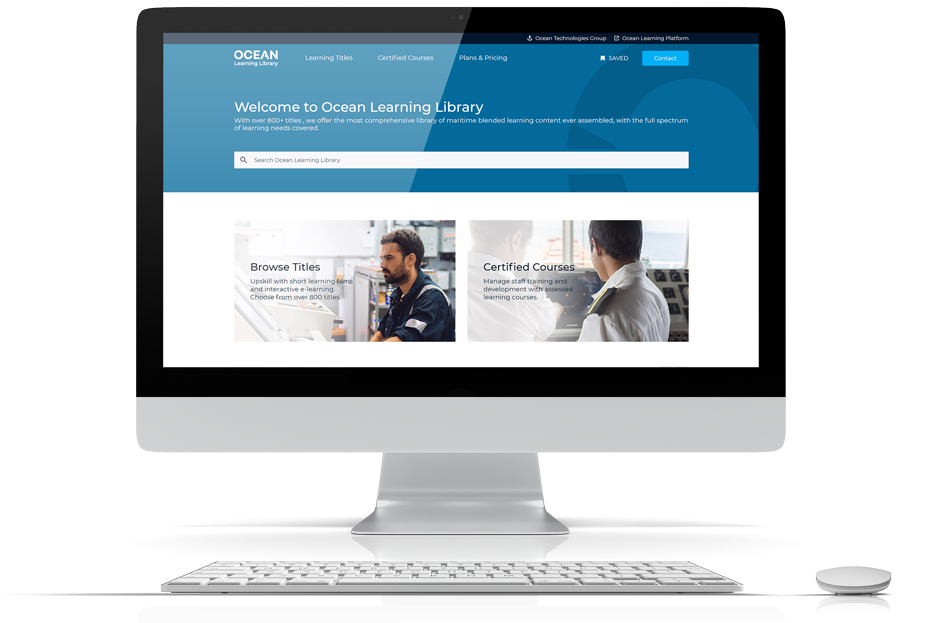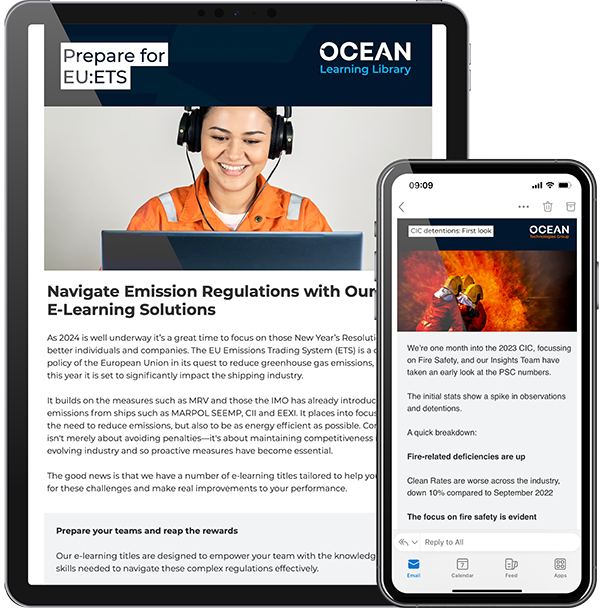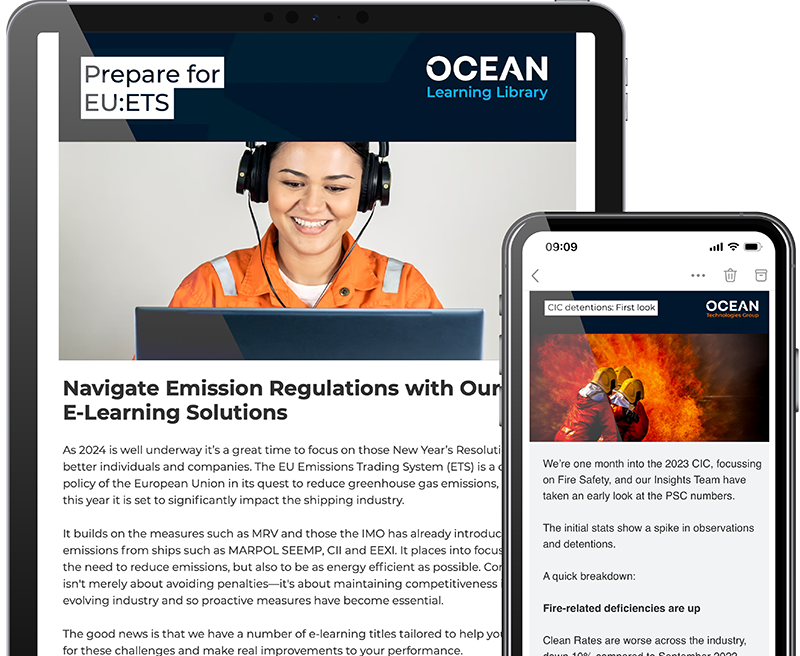Using Training to Navigate Towards a Sustainable Future
Since adopting its first international mandatory measures to improve ships’ energy efficiency in July 2011, the International Maritime Organization (IMO) has been intensifying its efforts to combat climate change. Aligning with the UN Sustainable Development Goal 13, the IMO’s revised Strategy on Reduction of GHG Emissions from Ships in 2023 sets ambitious targets aimed at achieving net-zero emissions from international shipping by around 2050. This includes reducing carbon intensity by at least 40% by 2030, and ensuring that alternative zero and near-zero GHG fuels make up at least 5%, aiming for 10%, of the energy used by international shipping by the same year.
This plan emphasises the need for maritime training programs to include sustainability topics, preparing seafarers to work in ways that are better for the planet. It suggests that the future of maritime operations should focus on sustainable development, shifting from traditional training to new methods that consider the health of our oceans and environment. [1]
New fuels and technology will be instrumental in meeting these targets. At OTG, we’re supporting our customers and wider industry by building training resources that will equip maritime professionals to deliver the promise these new technologies make. Alongside preparing people for the new tech that’s coming, we’re also equipping them with the knowledge to improve their performance today, with resources on energy saving and waste management.
By equipping your team with the knowledge and skills for more sustainable ways of working, you can improve both the operational and contribute to moving the industry towards global sustainability, in line with the IMO’s vision for a greener maritime future.
We’re dedicated to the growth and development of your seafarers. Our training programs are constantly updated to reflect the newest trends and best practices in sustainability, making sure your team can make informed, sustainable decisions.

Focused on Sustainability
We’re rolling out new training modules and updating existing learning to support our customers’ vision for a sustainable future. These modules are designed to enhance seafarers’ understanding of key sustainability concepts, and to enable them to safely adopt new technologies as soon as it is available.
Our new training courses are centred around the latest in sustainable maritime practices. This includes everything from the basics of environmental stewardship to advanced lessons on reducing emissions and conserving resources at sea. Our goal is to ensure every member of your team is equipped with the knowledge to make a positive impact on the environment through their daily actions.
We’re growing the number of resources that focus on the adoption of decarbonised fuels, a critical step in reducing the maritime industry’s carbon footprint. We explore the various types of alternative fuels available, their benefits, and how they can be integrated into current operations. This knowledge is crucial for your seafarers as the industry moves away from traditional fossil fuels towards more sustainable options.
To make our training as accessible and effective as possible, we’re leveraging the power of e-learning. This approach allows seafarers to learn at their own pace and at times convenient to them, making it easier to balance training with their duties. By using e-learning, content is always up-to-date, ensuring your team is always working with the latest information and best practices in sustainability. By reducing the need to send people for in-person training, our e-learning also reduces the environmental cost of travel.
Investing in training on new fuels and new technology is an investment in the future. By educating your seafarers on sustainability and the adoption of decarbonised fuels, you’re preparing them to lead the charge towards a greener horizon. This not only benefits the environment but also ensures the long-term viability and success of your operations.
Through these titles, your teams are not just learning about sustainability; they’re being empowered to become active participants in the global movement towards a more sustainable maritime industry.
How We Address Emerging Risks
As we navigate towards a more sustainable future for maritime, new fuels will play a significant part in our ability to meet sustainability targets. The adoption of alternative propulsion methods introduces new challenges and risks. Recognising these evolving risks, we at OTG are proactively expanding our learning library to address these concerns effectively to ensure that our clients always have access to the most current and comprehensive safety resources.
The shift towards alternative forms of propulsion on land, such as with the boom in electric and hybrid systems car ownership also brings new risks to maritime when electric cars are carried as a cargo. The safe management of lithium-ion batteries as cargo is critical to the safety of the vessel and crew. These batteries, while efficient, pose risks such as thermal runaway, which can lead to fires if not properly managed.
Through our longstanding industry relationships with and participation in key industry working groups, we are able to create world-first learning resources that keep our customers ahead of the curve. This is necessary now more than ever, with change outpacing some legislators’ ability to introduce common standards. Our commitment is to provide our customers with cutting-edge knowledge and solutions that ensure their operations are safe, compliant, and efficient. [2]
Expanding Our Learning Library
To mitigate these risks, we’re constantly broadening the resources available through OLP. We have created training modules focused on the safe handling, maintenance, and emergency procedures related to lithium-ion batteries, particularly in their role as cargo.
In the case of ammonia as a fuel, the first ammonia-powered vessels are due in 2025, with the IMO scheduled to produce interim guidelines for its safe use in September 2024. Through our involvement in working groups alongside The Nautical Institute and those formed as part of the Just Transition Task Force, we have created new e-learning that covers the known risks and their mitigations when using ammonia as a fuel.
This approach allows your team members to access the latest information and training modules anytime, anywhere, ensuring they are always prepared to manage the risks associated with new technologies.
Our goal is to ensure that your seafarers are not only skilled at managing the risks associated with new technologies, but to also equip them with the knowledge to prevent and respond to potential hazards effectively. This approach underpins our broader commitment to pioneering a safer, greener future in the maritime industry. The resources we provide extend beyond compliance, helping to develop a culture of safety and environmental responsibility that protects your seafarers, assets, and the marine ecosystem.
To learn more about our e-learning library
“OTG has always put seafarers at the heart of everything we do as without them our industry would not exist. Sustainability can’t just be a discussion in the boardroom, we have to ensure that everyone understands why it’s important and how they can work together to deliver more sustainable ship operations.
“Reducing the amount of energy we use and GHG emissions is obviously a big part of that, and decarbonisation is going to be the defining challenge of our lifetimes. It simply can’t happen unless our seafarers are equipped with the knowledge and skills that they need to safely deliver the transition from HFO to alternative fuels and the time is right to start preparing them for the changes to come,”
– Raal Harris, Chief Creative Officer.
The maritime industry’s best e-learning content
Unparalleled breadth and quality of content. We offer the most comprehensive library of maritime blended learning content ever assembled.


Subscribe to our Newsletter
Stay connected with our guides, insights, news and more.

